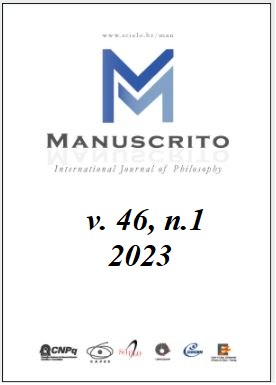Resumo
The “black page” in Spinoza’s Political Treatise has been much discussed and interpreted. These can be roughly divided into three groups: Approaches that see the “black page” as an extension of Spinoza’s theory of the passions and imagination; approaches that maintain that Spinoza excluded women from politics not because of their innate weaknesses but because of their social conditions; approaches that maintain that he excluded women because he saw them as weaker beings, but this contradicts his certain accounts, especially in the Ethics. In this paper, I take the latter view. My contribution is to argue that this contradiction is not unique to the Ethics. I pursue my reading along two lines, one ontological and one political. In the first, I focus on the continuity between the Ethics and the Political Treatise and show that the “black page” is also inconsistent with the ontology and methodology of the Political Treatise itself. In the second, I argue that the exclusion of women also contradicts the concept of the political absolute developed in this last work, since this concept problematizes any kind of exclusion and provides for political stability the strategic principle of increasing the number of decision-makers as much as possible.
Referências
AQUINAS, Thomas (Thomas d’Aquin). Somme théologique. Volume I. Translated by Aimon-Marie Roguet. Paris: Cerf, 2004.
ATHERTON, Margaret, ed. Women Philosophers of the Early Modern Period. Indianapolis, Cambridge: Hackett, 1994.
BARBONE, Steven. “Spinoza and the Problem of Women.” In Spinoza y la Antropología en la Modernidad. Edited by María Luisa de la Cámara García and Julian Carvajal Cordón, 349-356. Hildesheim: Georg Olms Verlag, 2017.
DEL LUCCHESE, Filippo. “The Revolutionary Foundation of Political Modernity: Machiavelli, Spinoza, and Constituent Power.” In Spinoza’s Political Treatise: A Critical Guide. Edited by Yitzhak Y. Melamed and Hasana Sharp, 190-203. Cambridge: Cambridge University Press, 2018.
DUROUX, Françoise. “Puissance et utopie au péril de la différence sexuelle.” In Spinoza: Puissance et Ontologie. Edited by Myriam Revault D’Allonnes and Hadi Rizk, 127-138. Paris: Editions Kimé, 1994.
ERGUN, Reyda, “Spinoza’da Kadın ve Kadınların Spinoza’sı.” In Spinoza Günleri 2: Yeni Dünyadan Eski Dünyaya. Edited by Reyda Ergün and Cemal Bâli Akal, 135-148. Istanbul: İstanbul Bilgi Üniversitesi Yayınları, 2011.
GATENS, Moira and Genevieve Lloyd. Collective Imaginings. Spinoza, Past and Present. London: Routledge, 1999.
GATENS, Moira. Imaginary Bodies: Ethics, Power, and Corporeality. London: Routledge , 1996.
GULLAN-WHUR, Margaret. “Spinoza and the Equality of Women.” Theoria 68 (2002): 91-111.
HOBBES, Thomas. Leviathan. Edited by J. C. A. Gaskin. Oxford: Oxford UP, 1996.
HOBBES, Thomas. De cive, The English Version. Edited by Howard Warrender. Oxford: Clarendon Press, 1983.
JAMES, Susan. “Democracy and the Good Life in Spinoza’s Philosophy.” In Interpreting Spinoza. Edited by Charlie Huenemann, 128-146. Cambridge: Cambridge UP, 2008.
JAMES, Susan. “The Power of Spinoza: Feminist Conjunctions. Susan James Talks to Genevieve Lloyd and Moira Gatens in the third of a series of WPR Interviews.” Women’s Philosophy Review 19 (Autumn 1998): 6-28.
JUSTINUS, Marcus Junianus. Epitome of the Philippic History of Pompeius Trogus. Translated by John Selby Watson. London: Henry G. Bohn, 1853. https://www.forumromanum.org/literature/justin/english/trans2.html
KEIL, Rainer. “Spinoza’s Theory of Absolute Democracy (TP, Chapters 7/5, 8/1, 11; TTP 16).” In Naturalism and Democracy. Edited by Wolfgang Bartuschat, Stephan Kirste, and Manfred Walther, 123-148. Leiden, The Netherlands: Brill, 2019.
KOSSMANN, Ernst Heinrich. Political Thought in the Dutch Republic: Three Studies. Amsterdam: Koninklijke Nederlandse Akademie van Wetenschappen, 2000.
KROP, Henri. “Femina / Mulier.” In The Continuum Companion to Spinoza. Edited by W. van Bunge, H. Krop, P. Steenbakkers, and J. van de Ven, 216-217. London/New York: Continuum, 2011.
LLOYD, Genevieve. “Dominance and Difference: A Spinozistic Alternative to the Distinction Between ‘Sex’ and ‘Gender’.” In Feminist Interpretations of Benedict Spinoza. Edited by Moira Gatens, 29-41. Pennsylvania: The Pennsylvania State UP, 2009.
LLOYD, Genevieve. Part of Nature: Self-Knowledge in Spinoza’s Ethics. Ithaca/London: Cornell UP, 1994.
LORD, Beth. “‘Disempowered By Nature’: Spinoza on The Political Capabilities of Women.” British Journal for the History of Philosophy 19, no. 6 (2011): 1085-1106.
MACHEREY, Pierre. Introduction à l’Ethique de Spinoza. Volume 3. Paris: PUF, 1995.
MATHERON, Alexandre. “Femmes et serviteurs dans la démocratie spinoziste.” Revue Philosophique de la France et de l’Étranger 167, no. 2 (1977): 181-200. JSTOR.
NEGRI, Antonio. Subversive Spinoza. (Un)contemporary variations. Edited by Timothy S. Murphy. Translated by T. S. Murphy, M. Hardt, T. Stolze, and Ch. T. Wolfe. Manchester/New York: Manchester UP, 2004.
NEGRI, Antonio. The Savage Anomaly. The Power of Spinoza’s Metaphysics and Politics. Translated by Michael Hardt. Minneapolis/Oxford: University of Minnesota Press, 1991.
O’NEILL, Eileen and Marcy P. Lascano, eds. Feminist History of Philosophy: The Recovery and Evaluation of Women’s Philosophical Thought. Cham, Switzerland: Springer, 2019.
RAMOND, Charles. “Sens et projet du Traité politique.” In Lectures de Spinoza. Edited by Pierre-François Moreau and Charles Ramond, 171-183. Paris: Ellipses, 2006.
RICE, Lee C. “Le Nominalisme de Spinoza.” Canadian Journal of Philosophy 24, no. 1 (1994): 19-32.
RUFUS, Quintus Curtius. The History of Alexander. Translated by John Yardley. London: Penguin Books, 2004.
SHARP, Hasana. “Eve’s Perfection: Spinoza on Sexual (In)Equality.” Journal of the History of Philosophy 50, no. 4 (2012): 559-580.
SPINOZA. The Collected Works of Spinoza. Edited and translated by Edwin Curley. 2 vols. Princeton: Princeton UP, 1985, 2016.
SPINOZA. Spinoza Opera. Edited by Carl Gebhardt. 4 vols. Heidelberg: Carl Winter, 1925.
STEINBERG, Justin. “Spinoza on Being Sui Iuris and the Republican Conception of Liberty.” History of European Ideas 34, no. 3 (2008): 239-249.
TUANA, Nancy. “Preface.” In Feminist Interpretations of Benedict Spinoza. Edited by Moira Gatens, vii-ix. Pennsylvania: The Pennsylvania State UP , 2009.
WAITHE, Mary Ellen, ed. A History of Women Philosophers. 4 vols. Dordrecht: Kluwer, 1987-1995.
WALTHER, Manfred. “From potestas multitudinis in Suárez to potentia multitudinis in Spinoza. The foundation of democracy inverted.” Studia Spinozana 16 (2008): 129-152.

Este trabalho está licenciado sob uma licença Creative Commons Attribution-NonCommercial 4.0 International License.
Copyright (c) 2023 Manuscrito: Revista Internacional de Filosofia


